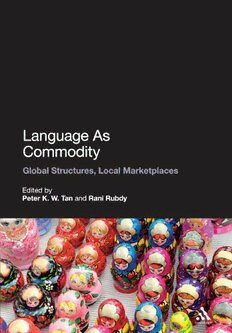Download Language As Commodity: Global Structures, Local Marketplaces PDF Free - Full Version
Download Language As Commodity: Global Structures, Local Marketplaces by Peter K. W. Tan, Rani Rubdy in PDF format completely FREE. No registration required, no payment needed. Get instant access to this valuable resource on PDFdrive.to!
About Language As Commodity: Global Structures, Local Marketplaces
Throughout human history, languages have been in competition with each other. As the world becomes more globalized, this trend increases. It affects the decision-making of those in positions of power and determines macro language policies and planning. Often decisions about language (or dialects or language variety) are related to usefulness - defined in terms of their pragmatic and commercial currency or their value as symbols of socio-cultural identity. Languages can be modes of entry into coveted social hierarchies or strongholds of religious, historical, technological and political power bases. Languages are seen now as commodities that carry different values in an era of globalization. This volume engages with language policies and positions in relation to the roles and functions these languages adopt. It examines the 'value' of languages, defined in terms of the power they have in the global marketplace as much as within the complex matrices of the local socio-politics. These valuations strongly underpin the various motivations that influence policy-making decisions, and in turn, these motivations create the tensions that characterize many language-related issues; tensions that arise when languages become commodified.
Detailed Information
| Author: | Peter K. W. Tan, Rani Rubdy |
|---|---|
| Publication Year: | 2008 |
| ISBN: | 9781847064226 |
| Pages: | 243 |
| Language: | |
| File Size: | 1.053 |
| Format: | |
| Price: | FREE |
Safe & Secure Download - No registration required
Why Choose PDFdrive for Your Free Language As Commodity: Global Structures, Local Marketplaces Download?
- 100% Free: No hidden fees or subscriptions required for one book every day.
- No Registration: Immediate access is available without creating accounts for one book every day.
- Safe and Secure: Clean downloads without malware or viruses
- Multiple Formats: PDF, MOBI, Mpub,... optimized for all devices
- Educational Resource: Supporting knowledge sharing and learning
Frequently Asked Questions
Is it really free to download Language As Commodity: Global Structures, Local Marketplaces PDF?
Yes, on https://PDFdrive.to you can download Language As Commodity: Global Structures, Local Marketplaces by Peter K. W. Tan, Rani Rubdy completely free. We don't require any payment, subscription, or registration to access this PDF file. For 3 books every day.
How can I read Language As Commodity: Global Structures, Local Marketplaces on my mobile device?
After downloading Language As Commodity: Global Structures, Local Marketplaces PDF, you can open it with any PDF reader app on your phone or tablet. We recommend using Adobe Acrobat Reader, Apple Books, or Google Play Books for the best reading experience.
Is this the full version of Language As Commodity: Global Structures, Local Marketplaces?
Yes, this is the complete PDF version of Language As Commodity: Global Structures, Local Marketplaces by Peter K. W. Tan, Rani Rubdy. You will be able to read the entire content as in the printed version without missing any pages.
Is it legal to download Language As Commodity: Global Structures, Local Marketplaces PDF for free?
https://PDFdrive.to provides links to free educational resources available online. We do not store any files on our servers. Please be aware of copyright laws in your country before downloading.
The materials shared are intended for research, educational, and personal use in accordance with fair use principles.

